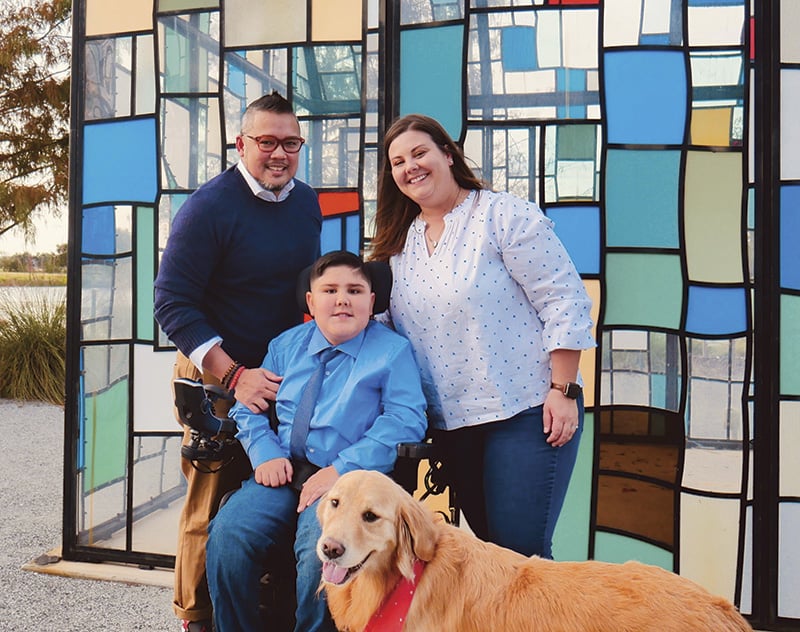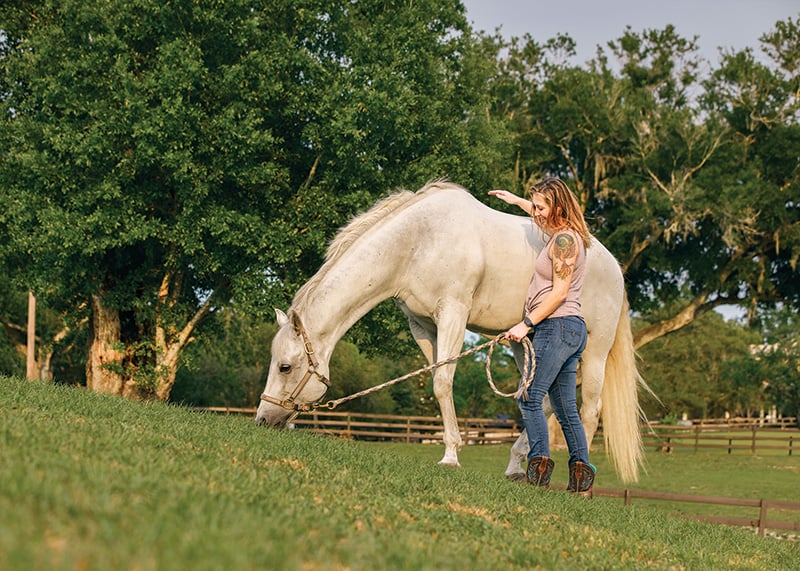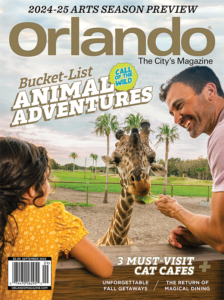Equine-Assisted Therapy Programs In Orlando Help Clients On Their Path To Wellness
Equine-assisted therapy programs take clients on an experiential journey to wellness.
“A horse knows what it is in your head, responds to what is in your heart and connects with your soul.”
—Angie Wells
The above quote by author and animal wellness coach Angie Wells captures the essence of equine-assisted therapy.
The practice of including the horse in physical- and mental-wellness therapy has been around for about 2,000 years, with ancient Greek physician Hippocrates writing about its benefits. The therapy in modern form has been in practice since the 1960s.
What exactly is equine-assisted therapy? Fundamentally, it is a form of therapy that teams up specially trained horses with a psychologist, counselor or therapeutic riding instructor to help bring about positive changes in clients. The therapeutic modality supports mental-wellness clients in learning to regulate their emotions and improves agility in those with physical disabilities. The therapy has been proven to increase self-esteem and confidence in all types of clients.
Orlando magazine visited two of Central Florida’s equine-assisted therapy organizations for a look at how these programs help people: Freedom Ride in Orlando and Crossroads Corral in Longwood.
A trip to Crossroads Corral came on a gorgeous day—blue skies, light breezes and mild temps—and it’s no accident that the setting is so relaxing. Mama, a barn cat, joins the conversation with cofounder Lindsay Brim and clinical psychologist Dr. Amber Fasula at a table beside the arena.

How does equine-assisted therapy differ from an office session?
“It’s quite different,” says Fasula, breaking into a smile as Mama jumps from the table into her lap. “It’s experiential. They’re physically moving and doing.
“In the office, we’re talking about examples and we’re going through coping strategies but they’re not doing it,” adds Fasula, who’s certified as a mental health specialist for equine-assisted psychotherapy. “That’s the power. [Horses] give us the opportunity to really practice who we can be.”
Clients don’t ride the horses at Crossroads Corral; all the work is done on the ground with the intention of increasing mental wellness. Clients range from children and teenagers to adults and U.S. military veterans.
Crossroads Corral has 10 horses on its 15-acre farm, allowing the organization to serve about 85 people a year. The nonprofit doesn’t own the property but is working toward that goal.
Brim and fellow horse owner Julie Hester cofounded Crossroads Corral in 2015 after a discussion about the purpose of life. They decided that they, and their horses, were here to contribute to the community.
“We both knew how horses can benefit people in so many different ways,” Brim says. “We started as equine-assisted learning, which is not therapy, it’s life-skill work.
Julie and I were certified to do that. We started doing that for free. It wasn’t until 2016 that we actually had a therapist—Kathy Wilkes. She’s on our board of directors now. She was the first therapist to join us.”

At Crossroads Corral, all the work is done on the ground with the intention of increasing mental wellness. Photo ©crossroads corral
There’s a lot to be learned from animals if you’re not looking to conquer them. As a prey species, the horse is instinctual. Survival demands the ability to act first, think later. As a companion animal, the horse has learned to absorb its handler’s state of mind, making it an instantaneous barometer of human emotion.
“Sometimes people are very defended and angry, and they’re frustrated, and they don’t recognize how they come across to others—their children or their significant other,” Fasula explains. A client in this state can be confused about the horse’s reaction and not understand that the animal is mirroring the client’s negative emotions.
The client adjusts the behavior, and the horse responds instantly. “That’s the nature of the horse. So as soon as they start to change how they’re interacting, the horse changes immediately.
“When a thousand-pound animal makes a change like that, you tend not to forget it. It’s powerful,” Fasula adds.
A trip to Freedom Ride came on another beautiful day. The nonprofit began in 1998 on 10 acres at the former site of the Ben White Raceway on Lee Road.
In 2001, the city of Orlando announced it would close the then 120-acre property to turn it into a park.
The team moved to its new home on Bay Lake Road two years ago amid a capital campaign to purchase the 25-acre property. Freedom Ride has 14 horses, including a spirited miniature that is particularly adept at teaching boundaries.
The therapeutic riding program serves clients aged five and up, with riders being referred by their physician.
They undergo an evaluation process to match each rider with a suitable horse.
“We basically tailor every horse and rider to each other,” says executive director Veronica Whetro during a walk among the old oaks, barns and riding arena.
Freedom Ride has five certified riding instructors who work with the clients. Four are certified through the Professional Association of Therapeutic Horsemanship International, an accrediting and credentialing organization.
Karen Boebinger, PATH Intl. certified head instructor and equine specialist, joins the conversation and explains the group’s work with veterans, which has become very popular.
Freedom Ride has a memorandum of agreement with Orlando VA Medical Center in Lake Nona and the Lake Baldwin Veterans Administration clinic, allowing veterans to come out for a recreational, on-the-ground session with the horses. Up to 10 veterans participate two times a week.
Awareness of all their programs is essential, Boebinger says, and invites interested residents to come out to the farm for a visit. Individuals may come out for a 45-minute wellness session with a horse to see if it’s something they would like to experience regularly.
Rebecca Lawrence, a licensed mental health counselor, is director of the Freedom Ride’s Mental Wellness Program and works with clients on the ground. The focus is on emotion regulation, she says, and the gains come much faster with horses in the equation.
In this program, clients do not ride the horses but instead work with them on the ground, along with the counselor and/or an equine specialist.
“I’d say the benefit of equine therapy is the way that horses are present from moment to moment, so they call on us to show up in the same way,” Lawrence says. “It can be particularly helpful in contrast to talk therapy because it is a nonverbal communication setting. Equine therapy helps with breathwork and emotion regulation, self-love and self-esteem. And there’s just more that you get out of it from being in the open air of nature than you do in a traditional therapy setting.”
She speaks of the connection the horses make with their handlers.
“When we brush a horse, it’s not just about the pampering, it’s about the connection. The relaxation of the repetitive movements for the person and the horse. We like to start there in my sessions. Especially with clients that struggle with attention deficit or post-traumatic stress.
“I have found that clients, especially teens, gain a lot of confidence when they know how to manage a horse. It’s building a relationship of unconditional, positive regard from the horse. It’s a gentle communication via body language that’s reciprocal,” Lawrence says.
Clients are matched with horses that suit their abilities and strengths as well as therapy goals.
A 10-year-old Gypsy Vanner gelding named Gravity is by far the favorite mount of Morgan Shelton, says her mom, Rachel Shelton. The Orlando residents have been coming to Freedom Ride for six years.
When asked what she likes best about the program, Morgan, 26, says, “Gravity. Everything to do with Gravity.”
If she could take him home with her, she would.
“[The program] is amazing. It gives Morgan so much confidence. She struggles with anxiety and for her it’s her happy place. She can get anxious at times, but she is able to cope and problem solve and figure out how to get through whatever issue she’s having with her horse; they do it together,” Rachel says.
The Sheltons found the program when the family moved here from Colorado.
“I literally Googled ‘therapeutic horseback riding Orlando.’ She was involved in a program back in Colorado for almost 10 years and the therapy that she got through the horse program far outweighed the benefits she ever got from speech therapy, physical therapy, occupational therapy,” Rachel says.
Shelton believes the other therapies were helpful in their own way but did not help instill confidence or build self-esteem or emotional joy.
“There wasn’t a lot of joy in physical therapy. It was hard work and [Morgan] had benefits from it, but the joy she gets from this is a benefit we could never have imagined when we started,” Rachel says.
Those who participate in these programs are the best advertising for them. It’s genuine and they want others to know the benefits they and family members receive by becoming involved.
“I would say if you are considering it at all, do it,” Shelton says.
“This is the one that really hit home for her. And if it hits home for someone else’s kid, it’s a success story all the way around,” she says. “I love these people more than I can ever say.”
For more information, visit crossroadscorral.org and freedomride.com




